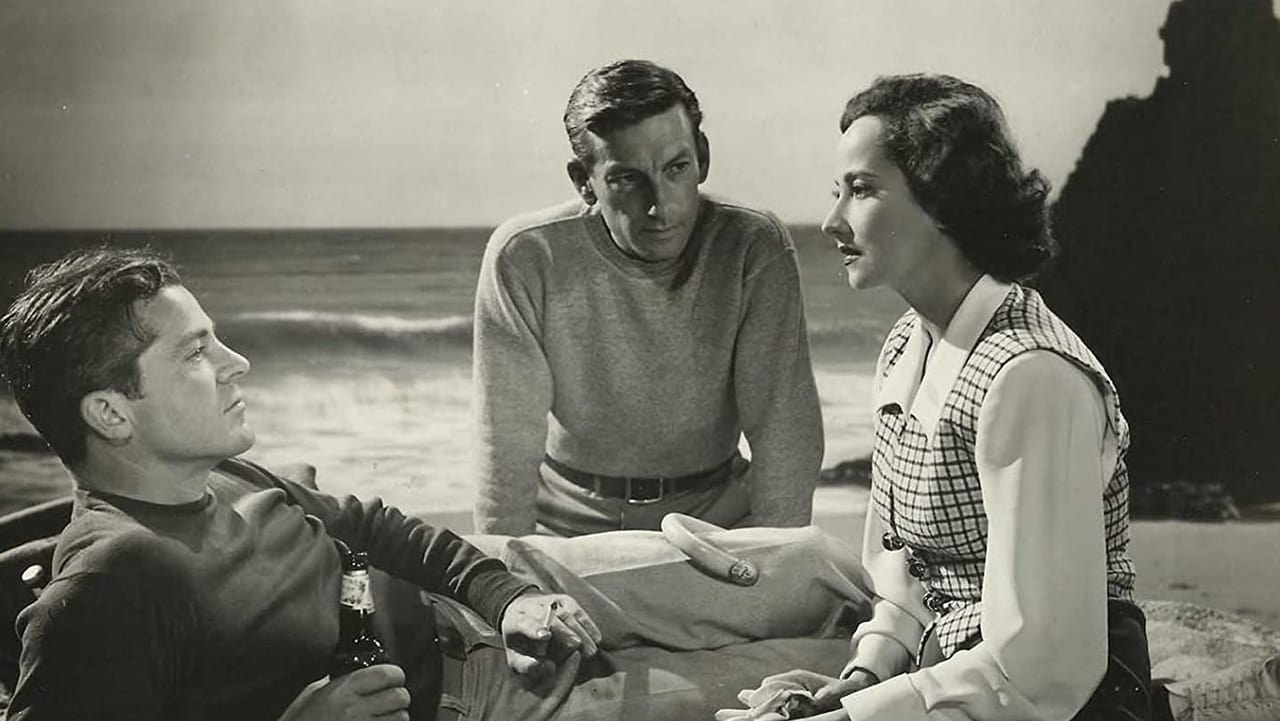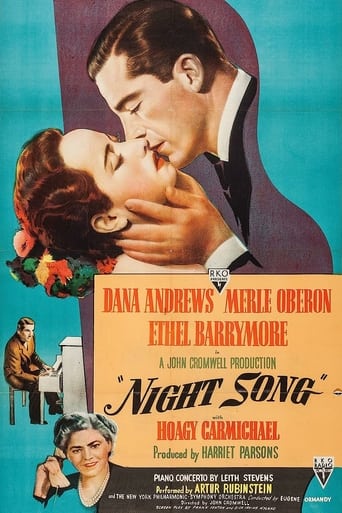Grimossfer
Clever and entertaining enough to recommend even to members of the 1%
Tyreece Hulme
One of the best movies of the year! Incredible from the beginning to the end.
Edison Witt
The first must-see film of the year.
Hayleigh Joseph
This is ultimately a movie about the very bad things that can happen when we don't address our unease, when we just try to brush it off, whether that's to fit in or to preserve our self-image.
l_rawjalaurence
NIGHT SONG might only appear to be a routine example of the kind of postwar romance that most of the major studios produced. A blind bar pianist (Dana Andrews) is taken up by a wealthy socialite (Merle Oberon), who pretends to be blind herself in order to secure his confidence. After a courtship in San Francisco, the pianist is given sufficient financial backing to have an operation to restore his sight, and receive a concert premiere of his new concerto at Carnegie Hall, New York. He returns to San Francisco, where he meets his beloved, and the two them vow eternal love.Frank Renton and Dick Irving Hyland's screenplay contains its fair share of intertexts. The idea of a concert performance dates back to Brian Desmond Hurst's huge British wartime hit DANGEROUS MOONLIGHT (1941), that contained the premiere of Addinsell's "Warsaw Concerto," while Andrews's predicament as a war-scarred survivor cross- references Goldwyn's THE BEST YEARS OF OUR LIVES (1946), in which the actor had given an equally memorable characterization in a similar role.Yet nonetheless NIGHT SONG possesses a certain integrity. Director John Cromwell establishes a close bond between Andrews and his boon companion Chick (Hoagy Carmichael, who even gets a solo number), and by doing so suggests the importance of male bonding in an often uncertain world. No one, it seems, knows really what to do with the peace, after having won the war; the only outlet both men can find is playing bands in some cheap SF dive bars.This relationship is contrasted with the more spiky friendship between Oberon and her boon companion Miss Willey (Ethel Barrymore). The grande dame of the American theater gives one of her more commanding characterizations as a supposed cynic with a heart of gold, who readily understands the agonies her younger friend experiences as she tries to woo the pianist without hurting his feelings. In an environment where people seldom gave vent to their emotions in public, emotional expression is put at a premium.The end of the movie is enlivened by a live performance from Leopold Stokowski and Eugeme Ormandy playing themselves with the New York Philharmonic Orchestra. They do not have to do much, but they set about delivering the concerto (with music by Leith Stevens) with a conviction and gusto that is truly refreshing.
edwagreen
This is basically a story dealing with loving someone for whom they are.Dana Andrews gives another wonderful performance as a blinded pianist who is bitter about his accident that left him like this. By chance, he meets the wealthy Merle Oberon, who falls for his music and pretends to be blind herself.When she sponsors a musical context knowing that he will win, he will have the money to have the surgery. With his sight restored, he doesn't get in touch with her leading her to believe that he is still blind.When the two come together as sighted people,you would think that Andrews would recognize her voice.Oberon does well as the wealthy dowager. Ample support is given by the craggy voiced Ethel Barrymore, her aunt, who plays along in the scheme as well as Hoagy Carmichael, the guy that Andrews lives with.A fine follow up for Andrews after doing such a wonderful job in "The Best Years of Our Lives," the year before.
Ramesseum
For those who did not live in the 40s, this film may appear to be soap-operish. However, one must remember that 60 years of Real and TV soap opera have drastically diminished its impact, leaving us with a feeling that we have seen it all before - forgetting that it was the "first". A blind musician, a wealthy socialite, an "all-knowing" aunt, a musical friend, Rubinstein and Ormandy - what a confection! And the "glue" that holds it all together is the music. After all, it IS "Night Song". Other reviewers have been rather harsh in their criticism of Leith Stevens' concerto. It should be noted that it has been recorded along with other film piano concertos on ELAN CD (Piano in Hollywood)and represents - along with the output of so many others - the greatest "American" symphonic music of the 20th century. Film music never gets its proper due. Whatever "romanticism" in this movie appears far fetched, it's no less plausible than the current crop of "action" films. For those who prefer clanging and banging, this "song" is not for you!
whpratt1
This was a very outstanding film for viewers who loved Merle Oberon, Dana Andrews, Ethel Barrymore and Hoagy Carmichael during the height of their careers in 1948. In this film, Cathy,(Merle Oberon),"The Broken Melody",'34, a rich woman who falls deeply in love with Dana Andrews,(Dan),"The Best Years of Our Lives",'46, who is blind and is a down and out piano player and composer. Dan has a great pal who is also a musician and they work and live together in a Jazz club and try to make ends meet. Dan's buddy is Hoagy Carmichael,(Chick),"To Have & Have Not",'44 who gives a great supporting role and is quite funny through out the entire picture. There is plenty of Classical music and a great appearance of a famous conductor and pianist. The is lots of romance, drama and comedy and a very unusual ending.

